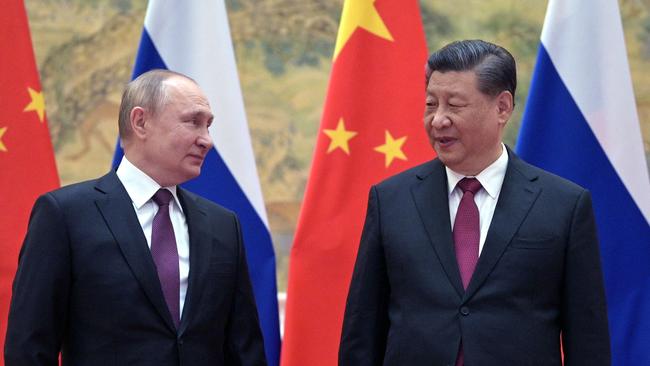Ukraine: Tough sanctions needed to head off a march of tyrants

There must be no misunderstandings about what Mr Putin’s true objectives are. In a rambling speech at the Kremlin that was televised live across Russia on Monday, Mr Putin listed his grievances about the West’s support of Ukraine after the collapse of the Soviet Union. Mr Putin wants NATO to scale back its military reach to the 1990s, before it expanded east of Germany, so former Soviet states can fall under the oppressive coercion of Russia once again. To set the ball rolling, Mr Putin has recognised the independence of the breakaway regions Donetsk and Luhansk, and instructed the Defence Ministry to assume “the function of peacekeeping”. Russia has controlled Donetsk and Luhansk via proxies since it fomented an armed separatist movement there, having annexed Crimea in 2014.
World leaders have denounced the Russian advance as “plainly in breach of international law” and “a flagrant violation of the sovereignty and integrity of Ukraine”. Foreign Minister Marise Payne said Mr Putin’s claim that eastern Ukraine’s Donetsk and Luhansk regions were independent states had “no validity”. She said personnel sent by Russia to Donetsk and Luhansk were “not peacekeepers”.
Australia has been working with other countries to co-ordinate sanctions aimed at putting direct financial pressure on Mr Putin and his inner circle. The US-led sanctions blueprint includes measures aimed at cutting off Russian financial institutions from the world economy by preventing them from dealing with foreign banks. President Joe Biden said the sanctions could be unveiled on Wednesday Australian time, declaring “we are co-ordinating with allies and partners on that announcement”. Australia will freeze assets of senior Russian officials and oligarchs who have money and real estate here and will act to stop Australia becoming a safe haven for targeted Russian figures seeking to avoid sanctions in other countries.
Mr Putin’s move to formally recognise Donetsk and Luhansk came as Kyiv asked the UN Security Council for an urgent meeting to tackle the threat of a Russian invasion. Ukrainian Foreign Minister Dmytro Kuleba made the request after a substantial escalation in military activity between Russian-backed forces and Kyiv government troops. By declaring independence for the Ukrainian territories, Mr Putin clearly has crossed the line and confirmed what world leaders had known: the massive build-up of Russian troops on Ukraine’s borders was about much more than war games, and Russia’s claim they were being withdrawn was a lie.
The Russian troops massed along the Ukrainian border represent an existential threat, first to an independent Ukraine and then to all of the territory that was able to break free from the communist grip of the former Soviet Union following the fall of the Berlin Wall in 1989. As Tony Abbott outlined in a clear-headed address to the Danube Institute in Budapest this week, Mr Putin sees himself as the new tsar, a ruler for life, determined to restore greater Russia. To that end he has invaded Georgia, annexed Crimea, occupied the Donbas, killed without compunction opponents at home and abroad, and restored Russia as a military superpower despite an economy smaller than Italy’s. After Ukraine, Mr Putin’s attention will turn to the Baltic States, then to Poland, then to the other former Soviet satellites, until Russia is again the overlord of eastern Europe.
For Mr Putin, it is a struggle that must be fought with the US as opposed to other NATO countries that are closer geographically to Russia. It reflects the Russian leader’s world view that global affairs be settled by great powers, of which he considers Russia to be one. NATO is seen merely as being directed by Washington.
Mr Putin’s grievance politics are similar to those of China’s like-minded authoritarian leader, Xi Jinping, who rails against US hegemony and has fomented nationalist sentiment by emphasising the humiliations endured by China after the Opium War of 1840. The danger for Australia is that the Chinese Communist Party might harness confusion over an unravelling in Europe to execute Mr Xi’s long-stated aim of reunification with Taiwan. Decisions taken now, first on sanctions against Russia for its flagrant disregard of international law in relation to Ukraine, will have a dramatic impact on future events around the world. Australia is right to join the global effort to protect eastern Europe from Mr Putin’s clutches. We are not immune from the tectonic shifts that are occurring in the world order at the direction of tyrants.


Strong, co-ordinated sanctions against Russia are needed in response to Vladimir Putin’s military incursions into Ukraine. A forceful response is the best, last-ditch opportunity to prevent a broader war that threatens to unwind completely the foundations of Europe’s post-Cold War peace and security. The cynical use of peacekeeping as an excuse to justify extending Russia’s direct influence in Ukraine’s two breakaway regions and strengthen its military hand against its neighbour is further proof, if any were needed, that Mr Putin has been playing the West for fools.